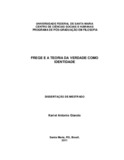| dc.creator | Giarolo, Kariel Antonio | |
| dc.date.accessioned | 2011-09-13 | |
| dc.date.available | 2011-09-13 | |
| dc.date.issued | 2011-04-08 | |
| dc.identifier.citation | GIAROLO, Kariel Antonio. Frege and the identity theory of truth. 2011. 172 f. Dissertação (Mestrado em Filosofia) - Universidade Federal de Santa Maria, Santa Maria, 2011. | por |
| dc.identifier.uri | http://repositorio.ufsm.br/handle/1/9095 | |
| dc.description.abstract | The main objective of this work consists in investigating the relationship between Frege s conception of truth and the so called Identity Theory of Truth . An identity
theory of truth is described in literature as the thesis sustaining that truth consists, fundamentally, in the identity between the content of a judgment or proposition and a fact. The proposition expressed by a sentence, as in Aristotle was a disciple of Plato , is true if, and only if, it is a fact that Aristotle was a disciple of Plato. Thus, the contents of the sentences would be in a relation of identity towards the facts, and would not be in a relation of correspondence, as classic theories of truth sustain. In Der Gedanke, published in 1918, Frege seems to sustain this theory, even though his conception of truth is much larger than that. On the article, he explicitly affirms that a fact is a thought that is true. Such affirmation fits perfectly in the identity theory
of truth s slogan. Nevertheless, there s plenty of discussion on the subject in secondary literature. Authors such as Baldwin, Dodd, Kemp, Horsnby and Sluga
have discussed the identification between facts and true thoughts, and have given explanations that are sometimes rather antagonistic. That is why it is of great value
the reconstruction and the discussion of such interpretations, in the attempt to clarify Frege s purpose on the referred affirmation. Along with that, it is necessary to review other aspects of Frege s philosophy, since his conception of truth in general, and, particularly, the identity theory of truth, are connected to the whole of his philosophy. | eng |
| dc.description.sponsorship | Coordenação de Aperfeiçoamento de Pessoal de Nível Superior | |
| dc.format | application/pdf | por |
| dc.language | por | por |
| dc.publisher | Universidade Federal de Santa Maria | por |
| dc.rights | Acesso Aberto | por |
| dc.subject | Frege | por |
| dc.subject | Verdade | por |
| dc.subject | Teoria da verdade como identidade | por |
| dc.subject | Teoria da verdade como correspondência | por |
| dc.subject | Frege | eng |
| dc.subject | Truth | eng |
| dc.subject | Identity theory of truth | eng |
| dc.subject | Correspondence theory of truth | eng |
| dc.title | Frege e a teoria da verdade como identidade | por |
| dc.title.alternative | Frege and the identity theory of truth | eng |
| dc.type | Dissertação | por |
| dc.description.resumo | A presente dissertação tem como objetivo central investigar a relação entre a concepção fregeana de verdade e a chamada teoria da verdade como identidade (Identity Theory of Truth). Uma teoria da verdade como identidade é caracterizada
na literatura como a tese segundo a qual verdade consistiria, fundamentalmente, na identidade entre o conteúdo de um juízo ou proposição e um fato. A proposição expressa por uma sentença, como Aristóteles foi discípulo de Platão , é verdadeira se, e somente se, é um fato que Aristóteles foi discípulo de Platão. Assim sendo, os conteúdos das sentenças estariam em uma relação de identidade com fatos e não
em uma relação de correspondência, como as teorias clássicas da verdade irão defender. Em Der Gedanke de 1918, Frege parece defender essa teoria, mesmo que a concepção fregeana de verdade seja muito mais ampla do que isso. Neste
artigo, ele explicitamente afirma que um fato é um pensamento que é verdadeiro. E tal afirmação encaixa-se perfeitamente no slogan da teoria da verdade como
identidade. Não obstante, na literatura secundária existe uma série de discussões sobre esse tópico. Autores como Baldwin, Dodd, Kemp, Horsnby e Sluga irão discutir essa identificação entre fatos e pensamentos verdadeiros dando respostas
por vezes antagônicas. Por isso, é de grande importância reconstruir e discutir essas interpretações na tentativa de esclarecer o propósito de Frege ao fazer tal afirmação.
Conjuntamente, outros aspectos da filosofia fregeana necessitam ser explicitados, pois a concepção fregeana de verdade em geral e a teoria da verdade como identidade, em particular, estão ligadas ao restante de sua filosofia. | por |
| dc.contributor.advisor1 | Greimann, Dirk | |
| dc.contributor.advisor1Lattes | http://lattes.cnpq.br/3324269321537765 | por |
| dc.contributor.referee1 | Sautter, Frank Thomas | |
| dc.contributor.referee1Lattes | http://lattes.cnpq.br/2804652028967760 | por |
| dc.contributor.referee2 | Rebello, Jaime Parera | |
| dc.contributor.referee2Lattes | http://lattes.cnpq.br/6958448117258202 | por |
| dc.creator.Lattes | http://lattes.cnpq.br/2275859935066492 | por |
| dc.publisher.country | BR | por |
| dc.publisher.department | Filosofia | por |
| dc.publisher.initials | UFSM | por |
| dc.publisher.program | Programa de Pós-Graduação em Filosofia | por |
| dc.subject.cnpq | CNPQ::CIENCIAS HUMANAS::FILOSOFIA | por |


